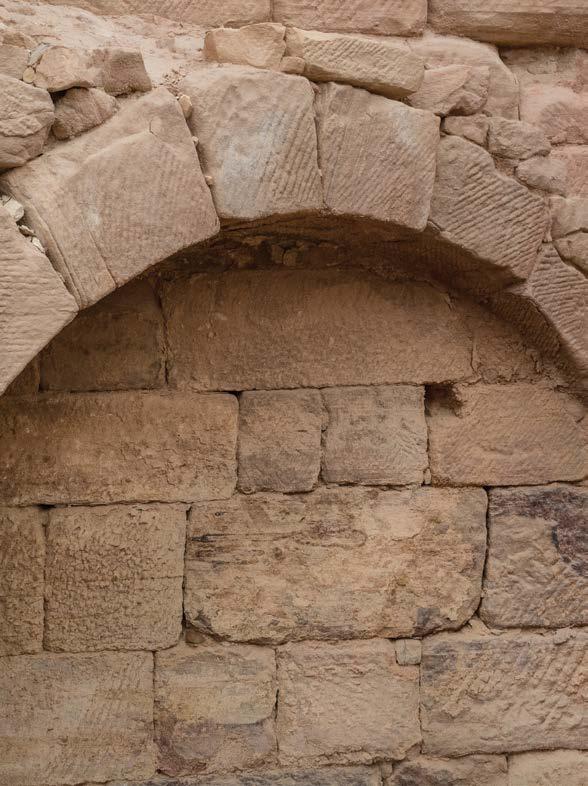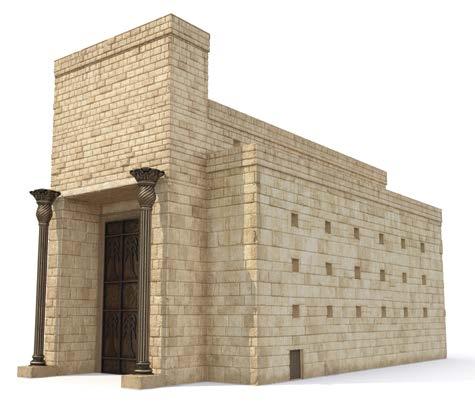
4 minute read
7th Degree: Provost and Judge
The Diary of Second Master Mason
by Mark Roth 33˚, Active for New Hampshire
I cannot express how disappointed I am. Disappointed—and angry, too! The stones for our section of the Temple were prepared as planned, checked and re-checked. Rocks cut, shaped, smoothed, and squared, cut to specification. We were sure that the work we produced was of the finest quality—all according to plan. Our work group even had more time than expected to be sure everything was in order while we waited for inspection. I finally had a moment to rest my aching back while we waited…and waited.
The overseer finally arrived to inspect the work. What I expected to be an easy inspection resulting in praise for fine workmanship was quite the contrary. The work was found wanting—worse yet, not found at all. Our work was halted. I was shocked to learn that Amos could not find the most important piece of his work. He is always meticulous. The best of the best! There is no greater Master Mason than Amos.
Amos! My co-workers and I trusted and respected him so much. He is the leader of our work group. He is the one we expected to set the example and lead the way for us, not only for a great accomplishment but for a sense of pride in contributing the highest quality workmanship to the most important project of all time—erecting the Temple, the House of God. We may always be nameless (known only as First Master Mason or Second Master Mason), but that is as it should be: nameless, in order to give all glory to the Grand Architect of the Universe. But Amos earned his name as a skilled craftsman. He is the one who could coach and mentor us when we needed it. He is the one to whom the most difficult work is given, because he is the one with the greatest skill. But in this instance, he let us down. He was careless with his work, and it hurt all of us.
I was even more shocked to learn later that Jeroboam shaped the keystone. After all, the keystone demands the greatest skill to produce the stone of greatest structural importance. There is simply no room for error. Disproportionate angles and sides will disrupt the pleasant appearance of the structure. If the stone is cut at the wrong angle, the load is not distributed evenly. The building will not stand. Jeroboam is not known to possess the skill needed to cut the keystone.
It made no sense. How could Amos be so careless and Jeroboam be so precise? To top it all off, the whole work group paid the penalty when the work was shut down—no work, no pay. What do I tell my family? How could this happen? So disappointing.
Now that the whole story can be told, I am still disappointed, but it is disappointment with Jeroboam. Everything is turned on its head. I expected more from Jeroboam. We knew that he lacked the skill of Amos. We knew he had difficulty keeping up with the rest of us in getting things done on time and with good workmanship. He was lacking. But to claim the work of another Master Mason as his own is not only shocking, it is unforgiveable. It cannot go unpunished.
We had our suspicions about Jeroboam, even though Amos would not believe the worst about his childhood friend. Amos had to be convinced to take his case to the Judges. He felt Jeroboam would never betray their friendship and trust. He would never lie about his work. Even when standing before the court, Amos was hesitant to push the case against Jeroboam.
I am thankful that the newest Provost and Judge interceded to find the truth. Such an upside-down situation simply did not seem right to him, and he found the answer with clear thinking and a bit of searching. When he opened the jeweled box of records, he uncovered the truth, and Jeroboam’s true character was revealed.
I am also thankful that Jeroboam confessed his jealousy and envy. For us, it will ease the memory of his betrayal. For him, it will be a source of humiliation forever.
But I am still uncertain how the story ends, or rather, continues. I am left with many questions: Why did Amos take Jeroboam back into our work group? Was he being just? Was he guided by principle? Fairness? Was it the right thing to do? How will Jeroboam make restitution for our lost wages and perhaps even our lost reputations? I’m not sure we should take Jeroboam back into our company. We cannot trust him. We cannot rely on his integrity ever again. Isn’t justice our due?

I thought it would be interesting to take a look at this degree through the eyes of one of the characters whose life was affected by the actions of another. Justice is the standard which keeps us all within due bounds and is the foundation of society. Is Justice served by the decisions of the Judge? Of Amos?
What do you think?
What do your Brother Master Masons think?
Witness the 7th Degree, Provost and Judge, and decide for yourself how you would exercise the core values of Justice and Integrity.








